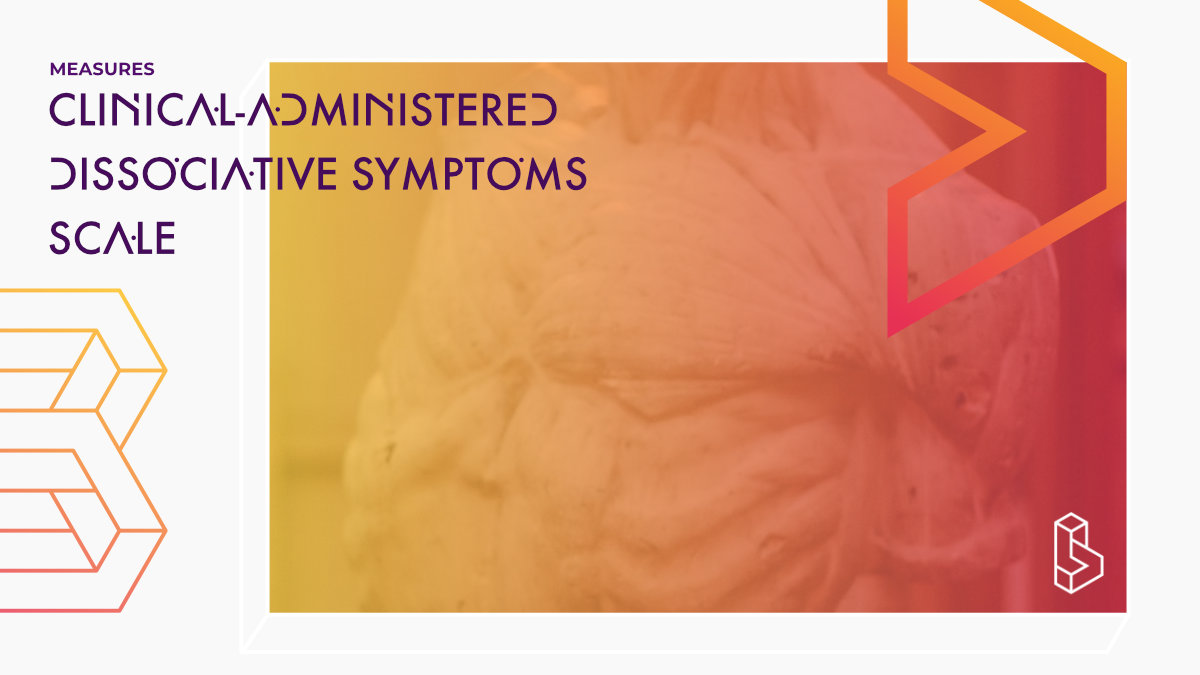The Clinical-Administered Dissociative Symptoms Scale (CADSS) is a scale used to measure dissociative states such as those induced by ketamine.
Active? Yes
First used: 01 January 1970
Related Papers
The relationship between dissociation and antidepressant effects of esketamine nasal spray in patients with treatment-resistant depressionThis posthoc analysis further analyzes the results of the TRANSFORM studies using esketamine for patients with treatment-resistant depression. In TRANSFORM-2 the percentage of responders (>50% reduction in MADRS) at day-2 and day-28 did not differ significantly between patients who did versus did not manifest significant dissociation. The mean peak dissociation (CADSS) scores significantly decreased across consecutive doses and fewer patients experienced significant dissociation after the last esketamine dose compared to the first.
Related Trials
A Naturalistic Study of Ketamine for Treatment Resistant Mood DisordersThis study aims to openly test the long-term safety, tolerability and effectiveness of repeated administration of IV, nasal spray and oral ketamine for treatment-resistant mood disorders.
Chart Review of Patients Undergoing Ketamine Infusions
This retrospective analysis aims to look at past data in order to further develop our understanding of ketamine in the use of psychiatry.
Comparing Ketamine and Propofol Anesthesia for Electroconvulsive Therapy
To determine the effect of ketamine, compared to propofol, when used an an anesthetic agent for electroconvulsive therapy (ECT) in the treatment of major depressive disorder (MDD).
Double-Blind, Placebo-Controlled Trial of Ketamine Therapy in Treatment-Resistant Depression (TRD)
This study is looking at the efficacy, durability, safety, and tolerability of multiple single doses of Ketamine vs. active placebo for treating patients with treatment resistant depression who are taking an antidepressant that is not working for them.
Examining the Impact of Sirolimus on Ketamine's Antidepressant Effects
The aim of the study is to provide insight into the impact of the immunosuppressant drug sirolimus, on the antidepressant effects of the prototypal rapid-acting antidepressant medication, ketamine.
Imaging Neural Correlates of Ketamine Using PET/MR
The purpose of this randomized, placebo-controlled study is to investigate pharmacodynamic differences between racemic ketamine and esketamine using functional fluorodeoxyglucose ([18F]FDG) positron emission tomography/magnetic resonance imaging (PET/MR)
Ketamine Alcohol (in Treatment-Resistant Depression)
This open-label trial (n=60) tests the hypothesis that ketamine (35mg/70kg) infusion will be especially effective in those who have a family history of alcohol abuse (Family History Positive, FHP).
Ketamine and Nitroprusside for Depression
The study team would like to see if nitroprusside can prevent the reported bad effects of ketamine without blocking the reported good effects. This might make ketamine a better treatment for depression.
Ketamine For Suicidal Ideation
This study will examine the effects of Intravenous (IV) ketamine both in an outpatient population and with subjects on the inpatient unit with suicidal ideation (SI).
Ketamine in Adolescents With Treatment-Resistant Depression
This study will test the use of ketamine for treatment of depression in adolescents that have not responded to other treatments. We will also examine neurobiological mechanisms of treatment.
Ketamine Interleaved With Electroconvulsive Therapy for Depression
Pragmatic, randomised, controlled, parallel group, pilot clinical trial of ketamine vs. midazolam interleaved with electroconvulsive therapy (ECT) as an adjunctive treatment for a major depressive episode. The main purpose of the pilot study is to assess trial processes to help inform a future definitive trial.
miRNAs, Suicide, and Ketamine - Plasma Exosomal microRNAs as Novel Biomarkers for Suicidality and Treatment Outcome
The purpose of this study is to examine whether neural-derived exosomal miRNAs are differentially expressed that are specific to suicidal ideation or behavior, and which by affecting specific miRNA targets and pathways, are associated with suicidal behavior and response to ketamine.
Open Label Ketamine Treatment for Major Depressive Disorder in Veterans
Medically healthy Veterans ages 21-75 that have been diagnosed with Depression will get up to 6 treatments of Ketamine infusions, weekly. After treatment is completed, follow up will occur at 1 month, 3 months, and 6 months after completion of infusions to evaluate the longer term effects of ketamine.
Pharmacogenetics Associated With IV Ketamine
The Canadian Rapid Treatment Center of Excellence (CRTCE) is a healthcare facility principally focused on providing best practices of intravenous ketamine treatment to adult patients suffering from treatment resistant depression. Patients who have received IV ketamine at the clinic are eligible to participate in this study where genetic biomarkers are correlated with response to IV ketamine.

